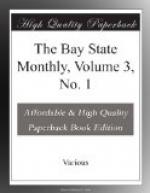In the year 1853, during the discussion in the Senate upon the resolution of inquiry presented by Mr. Douglas, Mr. Clayton, then Senator from Delaware, admitted that the ambiguity of the treaty is so great, that on some future occasion a conventional article, clearly stating what are the limits of the Central America named in the treaty, might become advisable.
This admission, from the lips of the very man who so diplomatically (?) represented the United States in the making of this vexatious treaty, is rather significant, and aids us of this generation in coming to the conclusion that the Clayton-Bulwer Treaty is a disgrace to this republic, and ought to be at once abrogated.
Another historical fact, with which few are familiar, and which shows the animus of this treaty, is this: In 1849 Mr. Hise, our minister at Nicaragua, reported to the Honorable Secretary of State that Nicaragua had offered to the United States, through him, “the exclusive right to build, maintain, and forever control an inter-oceanic canal across that republic; and offered to enter into treaty stipulations to that effect.” Mr. Hise strongly urged the acceptance of this offer, and prepared and forwarded to the State Department a treaty, accepted by the government of Nicargagua, which confirmed in specified terms the offer of full and complete control and government of said canal. For reasons best known to the Department of State, this treaty, called the Hise treaty, was never accepted or presented to the Senate for ratification and adoption, but was somehow quietly smothered, and the Clayton-Bulwer co-partnership treaty reported and adopted in its stead.
It will be seen at a glance, by even the most careless political tyro, that the Hise treaty was directly in line and accord with the express principles of the “Munroe Doctrine;” and that it would have given to this country the exclusive rights, which under the treaty adopted it must share with its co-partner, Great Britain. Had the United States accepted the offer made by Nicaragua, and thus obtained the exclusive privilege of opening and controlling the canal, we could have opened it to the commerce of the world, on such terms and conditions as we should deem wise, just, and politic; and it would have been more creditable to us as a nation to have acquired it ourselves, and opened it freely to the use of all nations, rather than to have entered into a co-partnership by which we not only have no control in prescribing the terms upon which it shall be opened, but lose the right of future acquisition and control of Central American territory. Had we accepted it (or should we accept the recent offer of Nicaragua to the same general effect) we should have held in our possession a right, and a might, which would have been ample security for every nation under heaven to have kept the peace with the United States.
Honorable Stephen A. Douglas, in commenting upon the conduct of the State Department of 1849 and 1850, said: “When we surrendered this exclusive right we surrendered a great element of power, which in our hands would have been wielded in the cause of justice for the benefit of all mankind.”




